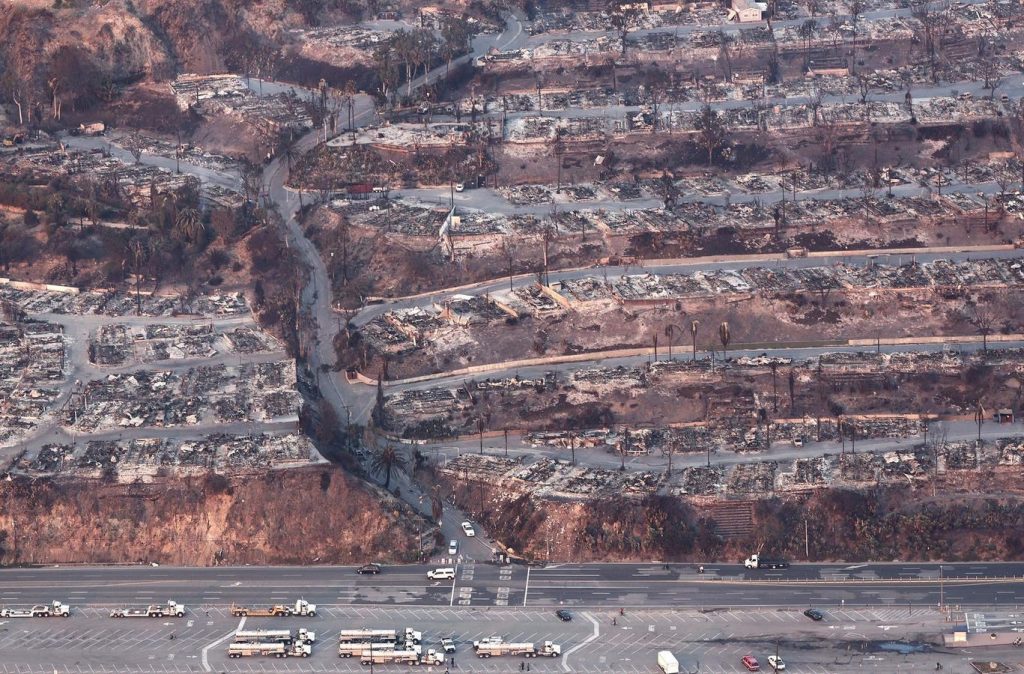California Wildfires Leave Trail of Devastation: A Collaborative Recovery Effort Begins
Over the past two weeks, a series of catastrophic wildfires have swept through the Los Angeles metropolitan area and surrounding communities, leaving a trail of destruction in their wake. As of the latest reports, 30 individual fires have ignited, consuming over 40,000 acres, claiming the lives of 25 individuals, and leaving another 31 missing. The toll on property is staggering, with over 12,000 structures damaged or destroyed, including homes and businesses. While some fires continue to burn, the focus has shifted to the arduous task of recovery, a collaborative undertaking involving government agencies, private sector organizations, nonprofits, and community members. The scale of the disaster is unprecedented, with seasoned emergency responders describing it as one of the most horrific they’ve encountered. The devastation extends beyond the loss of homes, impacting countless small businesses, the lifeblood of many local economies, leaving communities reeling from the combined loss of livelihoods and residences.
The impact on small businesses is particularly acute. Many entrepreneurs operated their businesses from their homes, losing both their dwelling and their source of income simultaneously. Main Street businesses, the heart of numerous neighborhoods, have been reduced to ashes, including shops, restaurants, and local gathering spots. The economic ramifications of these losses will be felt for years to come. Maria Salinas, President and CEO of the Los Angeles Area Chamber of Commerce, shared the heartbreaking accounts of close friends who lost everything, emphasizing the ripple effect of the disaster on the local business community. The Chamber, in partnership with Bank of America, has established a Small Business Disaster Relief Fund to provide immediate support to affected businesses. This fund offers needs assessments, one-on-one advising, assistance with loan applications, and direct grants ranging from $5,000 to $10,000, providing a crucial lifeline to businesses struggling to rebuild.
The recovery effort is a multifaceted operation, requiring coordination and collaboration on an unprecedented scale. Federal, state, and local governments have mobilized resources, establishing one-stop-shop resource centers to provide assistance to displaced individuals and businesses. The Federal Emergency Management Agency (FEMA) has deployed personnel to the region, recognizing the severity of the situation. Robert Fenton Jr., FEMA Regional Administrator, stressed the need for a whole community effort, emphasizing the vital role of partnerships between government agencies, the private sector, nonprofits, and the business community. This collaborative approach is essential to address the immediate needs of those affected and to lay the groundwork for long-term recovery.
Recognizing the critical role of public-private partnerships, the California Governor’s Office of Emergency Services (Cal OES) has established a donation portal to facilitate both monetary and in-kind donations. Abby Browning, Chief of the Cal OES Office of Private Sector and NGO Coordination, explained that the portal provides liability coverage for donors and ensures that donations are directed to where they are most needed. This mechanism allows businesses and individuals to contribute effectively to the recovery effort, ensuring that resources are used efficiently and transparently. The portal also facilitates the donation of in-kind goods, such as mattresses, ensuring that these essential items reach those in need without creating unnecessary logistical burdens.
The business community has stepped up to support the recovery effort in numerous ways. GoFundMe has created a centralized hub for verified fundraising campaigns related to the Southern California wildfires, providing a platform for individuals and organizations to raise funds for those affected. The U.S. Chamber of Commerce Foundation has established a resource center that offers up-to-date guidance and information on how businesses can contribute effectively to the response and recovery efforts. This resource center provides a valuable link between businesses seeking to assist and the organizations on the ground leading the relief efforts. Rob Glenn, Vice President of Global Resilience for the U.S. Chamber of Commerce Foundation, highlighted the various ways businesses can participate, from making financial contributions to donating in-kind services and supporting the long-term rebuilding process.
The recovery process is a marathon, not a sprint. The immediate response focuses on addressing critical needs such as shelter, food, and medical care. However, the long-term recovery will require sustained support and investment. Mark Smith, Executive Director of Recovery Operations for the American Red Cross, emphasized the importance of recognizing the long-term nature of the recovery process. While the initial response is crucial, the rebuilding process will take time, resources, and ongoing commitment. Businesses and individuals who are not currently in a position to contribute can still play a vital role in the months to come, as the need for support will continue long after the immediate crisis has subsided. The rebuilding process requires a sustained effort, and contributions will be needed throughout the long journey to recovery.


